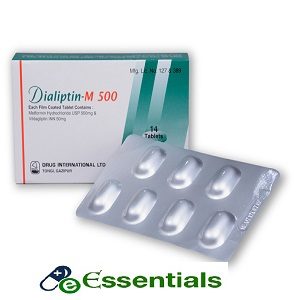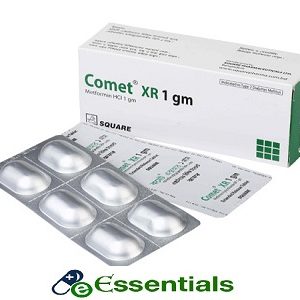Amaryl M 2mg+500mg 10pcs
৳ 180.00
Brand Name : Amaryl M 2mg
Manufacturer : Sanofi Bangladesh
Indications
Treatment of diabetes mellitus type 2 (in addition to diet, physical exercise and weight loss):
- When glycemic control cannot be achieved with metformin or glimepiride monotherapy;
- In case of replacement of combination therapy of glimepiride and metformin monotherapy in order to administer this combined medicine
Therapeutic Class
Glimepiride, a member of the sulfonylurea class, and Rosiglitazone maleate, a member of the thiazolidinedione class. The primary mechanism of action of Glimepiride in lowering blood glucose appears to be dependent on stimulating the release of insulin from functioning pancreatic beta-cells. In addition, extrapancreatic effects may also play a role in the activity of sulfonylureas such as Glimepiride. This is supported by both preclinical and clinical studies demonstrating that Glimepiride administration can lead to increased sensitivity of peripheral tissues to insulin.
Metformin is an antihyperglycemic agent which improves glucose tolerance in patients with type 2 diabetes, lowering both basal and postprandial plasma glucose. Metformin reduces hepatic glucose production by inhibiting gluconeogenesis and glycogenolysis, and stimulates intracellular glycogen synthesis by acting on glycogen synthase. In muscle, it increases insulin sensitivity, improving peripheral glucose uptake and utilization. Metformin also delays intestinal glucose absorption. Metformin increases the transport capacity of all types of membrane glucose transporters (GLUTs) known to date.
Dosage & Administration
This combination should be taken once or twice a day during a meal. Maximum single dose of metformin is 1000 mg. Maximum daily dose is 8 mg for glimepiride and 2 000 mg for metformin. Only for a small number of patients more effective daily dose is more than 6 mg of glimepiride. Initial dose of this combination should not exceed daily dose of glimepiride and metformin already being taken by a patient in order to avoid hypoglycemia.
Typically the dose of medicine this combination should be determined by the target glucose concentration in blood. It is necessary to take the lowest dose that would be sufficient to achieve the desired metabolic control. During treatment with medicine this combination, concentration of glucose in blood should be regularly determined. In addition, regular control of percentage of glycated hemoglobin is also recommended. Incorrect administration of the medicine, such as skipping of the next dose, should never be replenished by subsequent administration of higher doses.
Contraindications
- Diabetes mellitus type 1
- Diabetic ketoacidosis including history of diabetic coma and precoma, acute or chronic metabolic acidosis
- Increased sensitivity to sulfonylureas, sulfonamides or biguanides, as well as any of the excipients of the medicine
- Severe hepatic dysfunction (lack of experience of administration; in order to provide adequate glycemic control, such patients should be treated with insulin)
- Patients on hemodialysis (lack of experience of administration)
Side Effects
Pregnancy & Lactation
Pregnancy: Administration of the drug this combination is contraindicated during pregnancy because of the possible adverse effects on intrauterine fetal development. Pregnant women and women planning pregnancy should notify the doctor about this. During pregnancy and when planning, women with impaired glucose metabolism, which cannot be corrected with diet and physical activity, must receive insulin therapy in order to maintain normal blood concentrations of blood glucose level.
Breast-feeding: In order to avoid transfer of medicine to the child’s body through breast milk, women should not take this medicine in breastfeeding period. In case of need for hypoglycemic therapy, the patient must be transferred to the insulin treatment, otherwise she must discontinue breastfeeding.
Use in Special Population
Use in pediatric patients: Safety and efficacy of the medicine was not studied in children with diabetes mellitus type 2.
Use in elderly patients: Metformin is excreted mainly by the kidneys. Since there is the risk of development of severe adverse reactions to metformin in patients with impaired renal function, the medicine can only be used in patients with normal renal function. Due to the fact that renal function is reduced with age, metformin should be used with caution. You should carefully select the dose and ensure thorough and regular monitoring of renal function.
Storage Conditions
Brand
Sanofi Bangladesh












